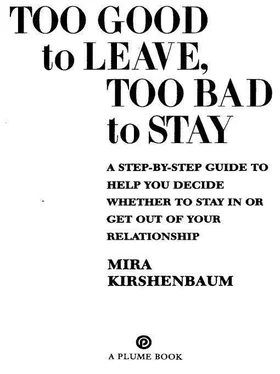Kirshenbaum, Mira - Too Good to Leave, Too Bad to Stay
Здесь есть возможность читать онлайн «Kirshenbaum, Mira - Too Good to Leave, Too Bad to Stay» весь текст электронной книги совершенно бесплатно (целиком полную версию без сокращений). В некоторых случаях можно слушать аудио, скачать через торрент в формате fb2 и присутствует краткое содержание. Жанр: Психология. Описание произведения, (предисловие) а так же отзывы посетителей доступны на портале библиотеки ЛибКат.
- Название:Too Good to Leave, Too Bad to Stay
- Автор:
- Жанр:
- Год:неизвестен
- ISBN:нет данных
- Рейтинг книги:3 / 5. Голосов: 1
-
Избранное:Добавить в избранное
- Отзывы:
-
Ваша оценка:
- 60
- 1
- 2
- 3
- 4
- 5
Too Good to Leave, Too Bad to Stay: краткое содержание, описание и аннотация
Предлагаем к чтению аннотацию, описание, краткое содержание или предисловие (зависит от того, что написал сам автор книги «Too Good to Leave, Too Bad to Stay»). Если вы не нашли необходимую информацию о книге — напишите в комментариях, мы постараемся отыскать её.
Too Good to Leave, Too Bad to Stay — читать онлайн бесплатно полную книгу (весь текст) целиком
Ниже представлен текст книги, разбитый по страницам. Система сохранения места последней прочитанной страницы, позволяет с удобством читать онлайн бесплатно книгу «Too Good to Leave, Too Bad to Stay», без необходимости каждый раз заново искать на чём Вы остановились. Поставьте закладку, и сможете в любой момент перейти на страницу, на которой закончили чтение.
Интервал:
Закладка:
This vision isn’t only about the relationship, it’s also about the other person. Part of falling in love with someone is having the feeling that in some special way he or she has something to offer above and beyond what anyone else could offer for meeting your needs and creating safety.
And most of us actually experience this vision when we’re first with our partner. It’s part of what enables us to go forward with the relationship, the evidence that someone could meet needs that have never been met and could offer safety we’ve never found before.
So it’s a terrible shock for all of us when this special refuge turns into a place of strife and deprivation, where things we want we simply can’t get, or we get them only after a painful fight, or we fight and we still don’t get them. Probably no experience is more common and more central in turning a relationship we’re content with into one we’re thinking of leaving than the experience of constant fights and unmet needs.
“All we do is fight these days.” “She never does what I want.” “He always does the same thing and I can’t get him to stop.” These are the most common complaints therapists hear from people at the beginning of couples therapy.
Worse Than Fighting
But this isn’t the worst. You fight because you hope you can win. But when things get really bad, you give up. Worse than fighting is a kind of cold, distant politeness, an emptiness, a cold war where it’s clear to both of you that if you’re going to get anything you want you’re going to have to get it outside of the relationship.
And like in most cold wars, there’s a ton of covert action, secret underground battles and sabotage where you both struggle for the slightest advantage while still trying to avoid the knockdown-drag-out fight you now know is a waste of time.
Fighting in Perspective
If you’re feeling ambivalent about your relationship and are agonizing over whether to stay or leave, you’ve got a special problem with all this. Your problem isn’t how bad it is. It’s how common it is. Sure, you hate what you’re experiencing. But even the most ancient forms of cultural understanding show marriage as a place of strife and unmet needs.
For example, in the Iliad, the very first work of Western literature, Zeus and Hera, the top god and goddess, fight like the old married couple they are and complain constantly about each other, just like Ralph and Alice on The Honeymooners. What image of marriage in popular culture, from Homer through Shakespeare through Dickens through every radio and TV sitcom isn’t filled with people fighting to get what they want and somehow always losing?
The shortest joke in the history of the world, complete in four words, is Henry Youngman’s “Take my wife, please.” What better testimony to the universality of strife in relationships? But when do you say enough is enough if you’re faced with a universal condition? The subtleties and complexities of this issue explain why, in spite of its importance, it comes so late in the diagnostic journey we’re making together.
STEP #30: THE ABILITY TO NEGOTIATE SOLUTIONS
The people who’ve said they were happy they left their relationship, as well as the people who said they were unhappy they stayed, were not babies. They didn’t have unrealistic expectations about being in a relationship with someone without having fights. They didn’t expect they’d always get everything they wanted and always be able to do whatever they wanted to do. They understood that there’s no long-standing relationship without conflict and disappointment.
But they had to deal with something a lot worse than this. The next question points to what they had to deal with:
Diagnostic question #30. Is it likely that, if you have a reasonable need, you and your partner will be able to work out a way for you to get it met without too painful a struggle?
In other words, it is actually true for you that, “It’s just too hard to get my needs met”?
Do you remember when we talked about power people? The diagnostic question in the “You’ve Got a Hold on Me” chapter was about your needs being obliterated, as if you were somehow not allowed to have needs in that relationship. Question #30 is different, and perhaps more difficult to answer. The focus isn’t on unmet needs but on unrewarding struggles. It’s not so much that none of your needs are met, as that you keep having the sense that it’s just not worth struggling to get your needs met. Too much fighting with too little to show for it.
To answer question #30, I think it will help if I lay out the four most important ways our partners make it hard for us to get our needs met without a too-painful struggle.
1. “I Can Do Whatever I Want, Right?”
Here’s one way your partner can make the relationship a place where it’s just too hard to get your needs met: doing what he wants when he wants it by himself without talking to you about it. It’s like the philosophy in the Nike commercials: Just do it. Instead of your partner having a big fight with you because he thinks it’s time the two of you got a new car and you don’t, he just surprises you one day with the car. It’s his way of saying, I don’t want to negotiate with you, and I’m not interested in our solving our problems together.
But that’s not like his going out one day and getting a haircut without talking about it with you. You had plans for the money he spent on the car, too. You had needs you wanted to get satisfied with that money, too, even if your need was only to know that the money was being saved for a rainy day.
In all my years of working with troubled couples, I see few things more destructive to relationships than people’s tendency to make “unilateral moves.” This is the expression for doing what you want when you want it without any prior discussion, although there’s usually a lot of angry discussion afterward. Someone who constantly makes unilateral moves is typically someone we think of as selfish or immature: “You never think of anyone but yourself,” we say.
Someone who makes unilateral moves will often invite you to do the very same thing: “Hey, I’m not saying you can’t do what you want. We should both be able to do what we want. I just don’t want to have to talk about it,” and he rolls his eyes.
You can see from this example how very different this issue is from power. Power people never say, “Let everyone do what they want.” But whether we’re talking about power people or people who make unilateral moves, you still end up not getting your needs met.
But as I made clear in the example of the guy who goes and buys a car, resources are limited and more often than not his getting his needs met without any prior discussion means you won’t get your needs met. And anything a person does can be a unilateral move, including pressuring you into having sex or insisting you talk about something you don’t want to talk about or showing up unannounced with a friend or relative for dinner or accepting a promotion at work that involves massive new responsibilities that you don’t even know about.
If your partner makes unilateral moves like these all the time and if you’ve talked to her about it and she won’t stop, then this is going to make it a lot less likely that you’ll be able to get your needs met.
2. “It’s Such an Ordeal Talking About the Littlest Thing”
Here’s another way people can’t get their needs met without too-painful struggles. It’s the problem that every how-to-have-a-happy-marriage book or workshop focuses on and what I’ve spent a lot of time helping couples with: how to sit down together and discuss needs openly and easily until you arrive at creative, commonsensical solutions that are good for everyone. If you can do it, it means you never have to say you can’t get your needs met.
Читать дальшеИнтервал:
Закладка:
Похожие книги на «Too Good to Leave, Too Bad to Stay»
Представляем Вашему вниманию похожие книги на «Too Good to Leave, Too Bad to Stay» списком для выбора. Мы отобрали схожую по названию и смыслу литературу в надежде предоставить читателям больше вариантов отыскать новые, интересные, ещё непрочитанные произведения.
Обсуждение, отзывы о книге «Too Good to Leave, Too Bad to Stay» и просто собственные мнения читателей. Оставьте ваши комментарии, напишите, что Вы думаете о произведении, его смысле или главных героях. Укажите что конкретно понравилось, а что нет, и почему Вы так считаете.












